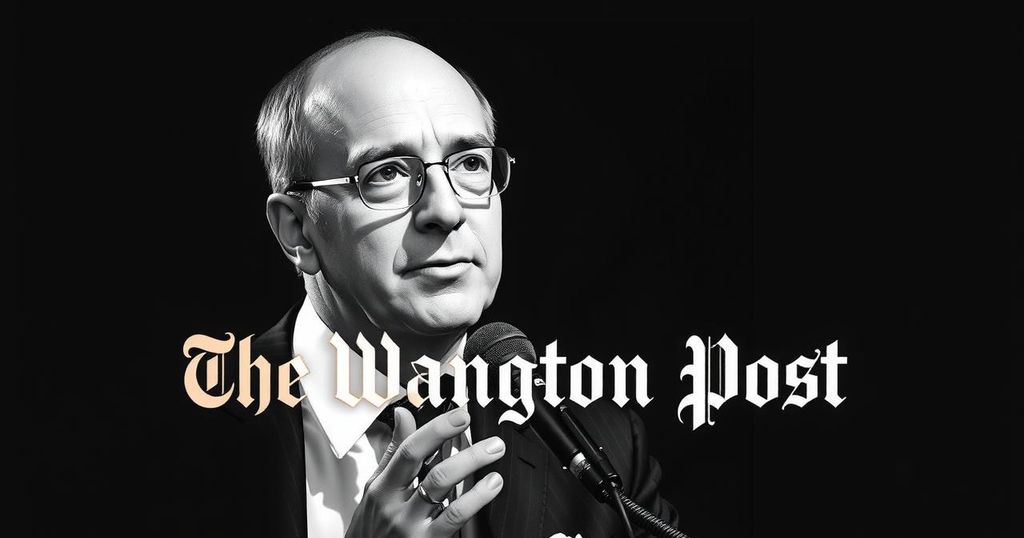Jeff Bezos Justifies The Washington Post’s Choice to Halt Presidential Endorsements

Jeff Bezos defended The Washington Post’s decision to end presidential endorsements, citing concerns over perceptions of media bias. The decision, which followed significant subscription cancellations, has sparked criticism among journalists and readers. Bezos emphasized that the move is aimed at restoring credibility, reinforcing the newspaper’s commitment to independence in journalism.
Jeff Bezos, the owner of The Washington Post, has defended the newspaper’s recent decision to discontinue presidential endorsements. This decision comes in the wake of reports indicating that approximately 200,000 subscribers have canceled their digital subscriptions, presumably in response to the announcement. National Public Radio (NPR) reported that this decision prevented a planned endorsement of Democratic candidate Kamala Harris, inciting frustration among some readers who attribute their dissatisfaction to Bezos, also the founder of Amazon and Blue Origin. In a response published in an opinion piece in The Washington Post, Bezos commented on the perception of media bias among the public. He argued that endorsement decisions do not significantly influence election outcomes but can create a false perception of bias and infer a lack of journalistic independence. Bezos stated, “Presidential endorsements do nothing to tip the scales of an election. What presidential endorsements actually do is create a perception of bias. A perception of non-independence. Ending them is a principled decision, and it is the right one.” The timing of this announcement, just two weeks ahead of Election Day, has led some critics to speculate that Bezos was concerned about potential repercussions from a possible Republican victory, particularly from Donald Trump. Bezos clarified that no candidates were consulted regarding this decision and refuted any claims of a quid pro quo, emphasizing that there was no relation to a recent meeting involving Trump and Blue Origin executives. William Lewis, the publisher and CEO of The Washington Post, reaffirmed that the newspaper will not endorse any presidential candidates in the upcoming November election or any future elections, stating that they are “returning to our roots of not endorsing presidential candidates.” The Washington Post, esteemed for its investigative journalism, including its coverage of the Pentagon Papers and the Watergate scandal, has garnered 76 Pulitzer Prizes. However, some journalists at the paper have expressed their concerns regarding the endorsement policy, leading to the emergence of dissenting opinions among its columnists, with some resigning in protest. In their statement, they voiced disapproval, asserting that this decision represents “an abandonment of the fundamental editorial convictions of the newspaper that we love.” Interestingly, The Washington Post’s decision parallels a recent announcement by the Los Angeles Times, California’s largest newspaper, which similarly opted not to endorse a presidential candidate, acknowledging a significant loss of subscribers as a consequence.
The Washington Post, known for its influential reporting in the United States, has historically engaged in the practice of endorsing presidential candidates. However, with the recent announcement that the newspaper will cease this practice, concerns regarding journalistic integrity and perceptions of bias have surfaced. As political climate intensifies with the upcoming election, the implications of such a decision extend beyond readership numbers and into the broader discourse surrounding unbiased journalism. The reaction from the public, including the mass cancellation of subscriptions, highlights the sensitivity surrounding such editorial choices and the responsibility of the media to maintain credibility.
In summary, Jeff Bezos has offered a robust defense of The Washington Post’s choice to discontinue presidential endorsements, arguing that such endorsements foster a perception of bias rather than influence election outcomes. The decision has elicited significant backlash from readers and journalists alike, raising important questions regarding the intersection of media credibility and political endorsements in today’s highly polarized environment. As the newspaper returns to its historical position of non-endorsement, the reaction from its audience will be crucial in determining the future trajectory of its readership and reputation.
Original Source: www.aljazeera.com







